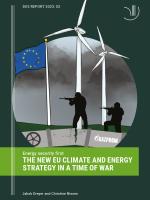The new EU climate and energy strategy in a time of war
The Russian invasion of Ukraine is changing the European security order as we know it. This DIIS Report sets out to analyse how the rapid changes in European security impact two decisive and inseparable policy areas: climate and energy.
The swiftness and determination with which the EU has acted has surpassed the expectations of most. To fulfil Europe’s energy and climate ambitions, the EU is implementing the REPowerEU action plan at a rapid pace. The EU has quickly negotiated wide-ranging sanctions and slashed its dependency on Russian coal, oil and increasingly also gas. Member states have significantly limited their energy consumption and found alternative energy suppliers, avoiding the immediate energy crisis many feared. Common European action to ensure stable and affordable energy supply has been unprecedented.
At the same time, however, the swift and urgent action to ensure security of energy supplies has come at a price for European coherency and global climate action. So, for the EU to tackle the energy-climate predicament, a comprehensive approach with a global outlook as opposed to ad hoc crisis management is needed. Denmark can help Europe develop such strategic outlook, but it requires Denmark as well as the other EU member states to compromise and sacrifice.
DIIS Experts






